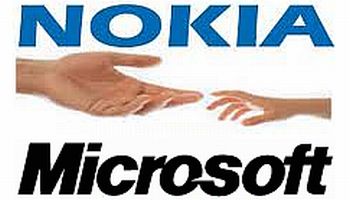

Nokia and Microsoft have officially signed their partnership deal that will see Windows Phone 7 appearing on Nokia handsets from next year.
The two companies have now formally begun a relationship that could radically change the mobility landscape in years to come.
Under the terms of that agreement, Nokia will manufacture devices loaded with Microsoft’s Windows Phone 7, a mobile operating system that eschews the iPhone’s or Android’s grid-like screens of individual apps in favour of subject-specific “Hubs.”
Both Microsoft and Nokia have lost substantial ground to their mobile competitors in recent years, and their partnership is widely viewed as a way for both to re-establish momentum.
Although Nokia will pay its partner royalties for copies of Windows Phone 7 loaded onto its hardware, it will ultimately receive billions of dollars from Microsoft.
Nokia will offer Microsoft its “expertise in operator billing” and hardware development, along with advancements in mapping, navigation, imaging and some location-based services. It will also open a branded application store that “leverages the Windows Marketplace infrastructure,” according to the statement, “and will allow developers to “publish and distribute applications through single developer portal to … consumers that use Windows Phone, Symbian and Series 40 devices.” In exchange, Microsoft will bring Bing search services to the Nokia device portfolio, in addition to its own expertise in other areas such as gaming and advertising.
Despite throwing its weight behind Windows Phone 7, Nokia remains publicly committed to support its Symbian OS through at least 2014. The company’s roadmap features new Symbian phones hitting the market in 2011 and 2012.
“There’s still a lot of ongoing development with Symbian, the two will co-exist,” Nokia’s Australian managing director, Chris Carr, is quoted as telling Australia IT. “We’ve invested a lot of money in Symbian.”
According to recent data from analytics firm comScore, Microsoft’s share of the smartphone market dipped to 7.7 percent for the three months ending in February – down from 9 percent in November 2010, and sufficient to place the platform behind Google Android, Apple’s iOS and Research In Motion’s BlackBerry franchise. Part of that decline can also be attributed to users abandoning Microsoft’s antiquated Windows Mobile platform, either for Windows Phone 7 or rival smartphones.
During its MIX11 conference in Las Vegas earlier in April, Microsoft touted Windows Phone 7 as an ideal one for third-party developers. Future additions to the platform include the introduction of Angry Birds in May, Skype and a Spotify music application sometime in the autumn, and a massive software update, codenamed “Mango,” which will introduce augmented reality capability, Internet Explorer 9, and a version of multitasking. Mango’s actual release date remains unclear, however.
But Windows Phone carries some risks for Nokia, something the manufacturer acknowledged recently in its publicly released Form 20-F 2010 report.
“If we fail to finalise our partnership with Microsoft or the benefits of that partnership do not materialise as expected, we will have limited our options and more competitive alternatives may not be available to us in a timely manner, if at all,” reads one section of that report. “Our expected transition to the Windows Phone platform may prove to be too long to compete in the smartphone market longer term.”
OpenAI chief operating officer Brad Lightcap to oversee international expansion as company consolidates lead in…
Chinese researchers publish details on device that could wreak havoc on undersea communications cables in…
Former Intel chief Gelsinger expands role at Gloo, becoming executive chairman and head of technology…
MEPs add to Commission pressure for second EU Chips Act amidst industry calls for renewed…
Smartphone maker Xiaomi reportedly raises about $5.5bn in Hong Kong share sale as it invests…
BYD's Qin L EV sedan starts at about half the price of Tesla's Model 3,…